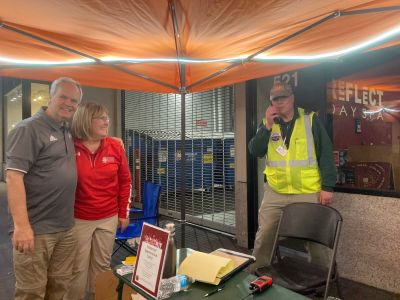JOB AID: Event VCC Lead
The purpose of this article is to prep staff to serve as the Lead at a Volunteer Coordination Center (VCC) during a parade event. The Lead is the on-site volunteer manager and leads/assists with communications coordination.
VCC Lead KSAs and Equipment
A VCC Lead should have training and experience in:
- Communications management, particularly experience with whatever radio(s) the volunteers and ECC use for the event;
- Volunteer management.
Supplemental (non-critical) KSAs include:
- Incident Command System (ICS) experience;
- Mental health crisis de-escalation;
- First aid certification (or higher).
Recommended personal equipment:
- Radios and extra batteries: If the ECC is activated, check out an 800 MHz and make sure it is fully charged. If volunteers will operate on FRS/GMRS, bring one FRS/GMRS radio for each channel they may simultaneously communicate on so you can monitor all frequencies (for example: if they will use two channels and have two backup channels, you need two radios).
- Weather appropriate clothing: Be sure to check that weather forecast before your shift!
- Camp chair or camp stool: You might regret it if you don't bring one. If you're bringing chairs for the VCC area, you probably won't need one.
- Weather relevant supplies: If it's gonna be hot and sunny, make sure you have some shade, sunglasses, and sunscreen. If it's going to rain, make sure you have watertight footwear and a rain poncho or umbrella (and preferably some cover).
The Volunteer Coordination Center (VCC)
Physically, the VCC is located just off the parade route. The purpose of a VCC is to:
- Coordinate volunteer communications (via radio or other means);
- Communicate with the ECC if it activated for the event;
- Distribute resources to volunteers (e.g. water, PPE, etc.);
- Check in and check out volunteers.
VCC Setup
It is generally not the responsibility of the VCC Lead to set up or tear down the VCC itself. However, that might emerge as part of the Lead's responsibilities if the event organizers are under-resourced and/or PBEM is taking the lead. If that is the case, recommended equipment includes:
- A 10' x 10' canopy;
- One folding table for every two people expected in the VCC;
- One chair for each person expected in the VCC;
- Clipboards, pens, scratch paper;
- A notepad you can use as a log or ICS 214;
- Laptop and MiFi;
- Water;
- Generator (run off of propane if possible...fewer fumes that way) AND extension cord;
- String lights or other light source if the event will take place at night.
VCC Security
It is important to consider security at the VCC. Activities at the VCC, particularly when volunteers are checking in and checking out, can be distractingly busy. While you and volunteers are working hard, opportunistic bad actors could be eyeing personal backpacks or expensive equipment, such as a generator.
If there are concerns about security, the VCC Lead should detail an additional volunteer to simply keep watch (and do nothing else). Most prospective thieves will be discouraged when it's clear that someone is keeping an eye out. If the event takes place at night for any duration, be prepared with lights. Good lighting creates a defensive area, is a psychological deterrent to criminal intent, and creates a safer space overall.
Remember that safety is the number one priority. VCC staff should not risk physical confrontations to prevent a theft. Instead, radio the incident in to the ECC to request help from nearby police officers.
VCC Roles
Well before the event, the VCC Lead should consider what other roles they need present at the VCC. The Lead should not leave the VCC post (unless a safety reason demands they move out), and will never be alone. If a VCC Lead must, they will detail at least one Parade Guide to the VCC before the VCC Lead is left alone. Roles that the VCC Lead should consider include:
- Check-in/Check-out: Specializes in checking in the Parade Guides when they arrive at the post and giving them their barricade assignment. When a Parade Guide checks out, the person(s) in this role can accept the check-out either in person or by radio.
- Tactical Radio Lead: Monitors the FRS frequency Parade Guides are speaking on and moves the frequency if necessary.
- Runners: Can run critical messages to a barricade if the Parade Guide at a location is not available by cell phone or radio. Runners can also take over for Parade Guides who need to leave post to use the restroom. Best detailed to a volunteer who brought a bike.
- Lookout: Detailed to keep a security eye out at the VCC so others at the VCC are not distracted by prospective bad actors. Well suited to a volunteer with de-escalation training or skills.
VCC Timeline
As a general rule, the VCC will be busiest just before and just after the event. VCC staff should plan accordingly.
- VCC Setup: Setup should take place no later than 30 minutes before Parade Guide check-in time. Note, however, that many volunteers are likely to arrive early.
- Volunteer check-in: Depending on the size of the event, the check-in period will take about a half hour as well.
NOTES:
- Assign VCC radio call signs
- When checking people in, go over Ops Plan briefly
- Recommend night equipment: generator, lights, lantern, flashlight
- Double check in policy
- include download of check in sheet
